- Home
- Joel Rosenberg
The Silver Crown Page 2
The Silver Crown Read online
Page 2
"You want me to have your horse saddled?"
"Fine. But make sure the bellybands are tight—no, forget it." He shook his head. "No, I'd better take care of Stick." No reason to put someone else to the trouble when Karl would have to check the work himself.
"Anything else?"
"Mmm—tell Chak I want to see him when he gets a chance. That's all."
She nodded and left.
Tossing his blankets aside, Karl dressed quickly, first donning skintight knit-cotton pants and a thick under-shirt. He pulled on a pair of rough leather trousers before slipping on his socks and forcing his feet into his tight steel-toed boots.
Vibram, he thought, for the thousandth time. How much would I pay for one pair of Vibram soles? Certainly a hundred pieces of gold; definitely his third-best horse. But would he trade, say, Carrot or Stick for a good pair of soles? Probably not, but it would be a close call. Not that he'd ever get the chance; such synthetics were easily a hundred years away on This Side.
He uncorked a jug of water and drank a scant mouthful, then splashed some on his face, drying it with a dirty towel. He slipped his leather tunic over his head before belting his sword around his waist, reflexively checking to see that it was loose in its scabbard.
Forming his hands into fists, he stood and stretched broadly, trying to loosen the almost permanent knots in his neck and shoulders.
Dammit, he thought, this doesn't get easier.
He stooped to retrieve two unloaded pistols and a small pouch from his saddlebags, tucked the pistols cross-ways in his swordbelt, and tied the pouch to a small brass ring mounted on the right side of the belt. He gave his hair a quick fingercombing before blowing out the lantern and stepping out into the night.
Above, a million stars winked at him out of a coal-black sky. The faerie lights were active tonight. Sometimes, when they changed slowly, it was difficult to distinguish them from stars, but not tonight. Hovering halfway between forest and sky, they flickered on and off, pulsing through a chromatic scale. First a series of deep reds, then a quick flash of orange before they worked their way through the yellows, greens, and a chorus of blues, turning indigo and vanishing, only to reappear in a few moments in a flash of cerulean.
"Lights are bright tonight," Wellem said. He stood sharpening a dagger and staring up at the sky. His hands moved in a smooth, practiced motion, stroking the stone lightly, evenly across the blade. "Awfully bright."
"That they are."
"Makes me feel like I'm back in Ehvenor, almost." He sighed. "Not used to seeing them so far north."
"What do you think they are, really?" Karl asked idly.
"I haven't learned anything new, Karl Cullinane." Wellem shrugged. "I can still only give you the faerie answer: 'Sometimes they are, and sometimes they are not.' Tonight they are." He turned away, still whisking the stone against the dagger.
There had been a time when a younger, less jaded Karl Cullinane would have stood and admired the clear sky, the many colors blinking in the night—
But that time, that youth, was gone. Now he simply saw a sky clear enough, a night bright enough to provide little cover for either the slavers or for Karl's people. Too bad—were it cloudier, the darksight of his six dwarf warriors would have given their side an extra edge. Karl always took any advantage that came his way. He saw no sense pushing his luck further than necessary; as it was, it was necessary to stretch it awfully far.
The encampment spread out around him on the mesa. His hundred warriors were breaking camp. Some brought down the tents and stowed the noncombat gear; some gave a final cleaning to a crossbow or flintlock rifle; others took a few moments to touch up the edge of a sword or a Nehera-made bowie. The tiny cooking fires had long since been doused; a few stray embers might have betrayed their presence to slavers en route from Pandathaway to their hunting grounds in the east.
All made their preparations quietly, with only an occasional grunt or muttered comment. Before a battle was always a quiet time. By dawn, even if everything went well in the forest below, some would surely be injured or dead.
The bushes behind him rustled. He reached for his sword.
" 'Yea, though I walk through the valley of death, I will fear no evil . . . '" a familiar voice said.
Karl let his hand drop. " ' . . . for I am the meanest son of a bitch in the valley,' " he finished. "That's too long, Walter; not a good password. Besides, I'm the one already in camp; I'm supposed to give the challenge, not you. Cut the crap and come on out. And be more careful next time—Gerrin already spotted you."
"Damn dwarf has good eyes," Slovotsky said, pushing his way through the brush. As usual, he was dressed only in sandals and a blousy pair of pantaloons, his throwing knives strapped to his right hip, a shortsword belted to his left. His chest, arms, and face had been blackened with a mixture of grease and ashes, and his chest and belly were scraped bare in spots, but his cocky, all-is-right-with-the-world-because-Walter-Slovotsky-is-in-it smile was intact, although just barely so.
"Welcome back," Karl said. "I've missed you. I've been getting a bit nervous; it feels like it's been a long time."
"Sure does. It's good to be back." The corners of Slovotsky's mouth lifted into a knowing smile. "You're not the only one. But thanks, anyway." He fondled his own spider amulet between thumb and forefinger. "You're not going to like this, Karl," he said. "This thing started flashing red—the slavers have a wizard with them."
"Damn!" Karl spat. That was surprising, but not unprecedented. Usually, only the largest Slavers' Guild raiding parties would spend the money on the services of a wizard. "Well, we can handle that—just have to take the wizard out first." Wizards were just as subject to a surprise attack as anyone else, after all.
"That was the good news. Karl, they have guns."
"What?"
"Guns. I spotted three, and there're probably others. Could be rifles, maybe smoothbores—they look just like our flintlocks, as far as I could see. I didn't want to get too close; I've always thought I look better without bullet holes."
This was bad. And it shouldn't be happening. The secret of making gunpowder was something that Karl, Walter, Ahira, Andy-Andy, and Lou Riccetti guarded carefully. Riccetti had yet to share the secret with any of his Engineers, though undoubtedly most of them suspected what the ingredients were. But Engineers didn't talk.
To the best of Karl's knowledge, no guns or powder had fallen into unauthorized hands during the five years they'd been using guns on This Side.
They'd known it wouldn't last forever, but Lou Riccetti's guess was that it would take a minimum of ten years for the secret to get out, and Karl had thought Lou's estimate conservative, if anything. While there was room for error, the mixture had to be close to the traditional ratio of fifteen parts saltpeter to three parts sulfur to two parts powdered charcoal for it to be usable gunpowder. It would take a long time for others in this world to work out the ingredients and proportions, given only descriptions of the weapons that the Home raiders were using to supplement their bows and blades. The construction of rifles that didn't blow up in a user's face should have slowed the locals down, too.
It should have taken a long time. . . .
"Damn," he said. "You're sure? Never mind." He gestured an apology. If Slovotsky was willing to make the absurd claim that the slavers had guns, then the slavers had guns.
Karl beckoned to the nearest of his warriors, a gangling teenager whom he often used as a message runner.
"Yes, Karl?"
"Erek—message for Tennetty. No attack yet; tell her to have the horses hobbled. I want a staff meeting, right away. I'll need the squad leaders up here, and fast. And I'll want some fire for the lantern in my tent. Repeat."
Erek closed his eyes. "Attack postponed indefinitely; Tennetty to order the horses hobbled. Chak, Peill, Gwellin, and Tennetty to report to you, here, immediately. Your lantern to be lit."
He opened his eyes, looking questioningly at Karl. At Karl's nod, Erek smiled and
ran off.
"Good kid," Slovotsky said. "Too bad he's such a lousy shot."
"Guns aren't everything." Karl snorted. "I wish you were as good with a sword. Little Erek can outscore Chak almost a quarter of the time." He beckoned Slovotsky into his tent as Wellem arrived with a lantern.
"You want it now?" Slovotsky asked, seating himself tailor-fashion on the rug.
"Save it. The others will be along in a minute."
* * *
Being in charge, Karl thought, all too often required listening to silly arguments. It wasn't enough to command obedience; he had to earn it—not once, but over and over again. And one of the things that meant was giving his warriors room to be wrong, at least when being wrong wouldn't hurt anything.
"Why all the fuss?" Gwellin shrugged. "They might not move on in the morning—"
"They will," Slovotsky put in. "Why would they stay?"
"Come nightfall tomorrow, we'll have the dragon to help out. Bullets can't hurt it."
"Idiot!" Tennetty spat. "What if they have dragonbane? Besides, do you really think we can take them by surprise with a dragon in the sky?"
"So who says we have to surprise them? Ellegon should be able to roast all of them."
"Fine idea. I'd love to see that." She turned to Walter. "Roasted gunpowder is kind of noisy, isn't it?"
"Yup. Not a good idea, not if I'm going to be anywhere in the neighborhood—and most particularly not if we want a sample for analysis. Try again, Gwellin."
"Then," the dwarf said, pounding a fist on the ground, "I'd say we just let this group go." Gwellin and his six dwarves were serving with Karl's team only temporarily, saving their shares of the loot, building up their savings so that they could return to Endell well laden with both captured valuables and acquired knowledge. Karl liked having Gwellin around; it was good to have the advice of someone who could be more objective, more businesslike about the business of killing and robbing slavers.
"Go on," Karl said. "Why do you think we should let them go?"
The dwarf stroked at his craggy face. "They aren't pulling a chain of slaves, so all we could get out of this would be a bit of blood, whatever money they have on them, and maybe this powder of theirs. I don't think they'll be carrying a lot of gold, not a group this size. And I don't want to face guns, not if we don't have to." He hefted his oversized mace. "I can't move this faster than a bullet."
"Don't be stupid." Ch'akresarkandyn shook his head. He was short for a human, only a head taller than the dwarf. The movements of his head and hand were slow and lazy, but Chak was neither; the dark little man was a good swordsman and an energetic and effective teacher of both blade and gun. "Do you know how to make gunpowder?"
"No, do you? What's the point?"
"The point," Tennetty put in, her usual sneer firmly in place, "is that they shouldn't, either." She looked over at Karl, her forehead momentarily wrinkling, as though she was wondering why he let this discussion go on. Tennetty's squad was run without dissension; her warriors could either do exactly what she said, when and how she said it, or they could find someone else to lead them on the next raid. "And we have to find out how they got it, and—if possible—cut it off at the source."
Idly, she brought her right index finger up and slipped it underneath her eyepatch, scratching. Karl made a mental note to have Thellaren look at the socket, once they got back to Home. Or maybe he'd try to push her into getting the glass eye that the cleric had been trying to sell her on.
Gwellin shrugged. "That is your concern—the fire burns in your belly, not mine."
"You're right about that," Tennetty agreed grimly.
"But how did they get the powder?" Peill asked. The elf steepled his overlong fingers in front of his face, considering. "It must be that Riccetti. He must have sold out."
"Peill," Slovotsky said, with a loud snort, "there is an old saying, back on the Other Side—"
"Not again." Chak threw up his hands. "There's always an old saying back on the Other Side. And for some reason, they're always called Slovotsky's Laws. Which one is it now?"
"The one I was thinking of goes something like this: 'When you know not whereof you speak, your mouth is best used for chewing.' Forgetting the fact that Lou has never even had the opportunity to sell out, there's about as much chance of his betraying a friend as there is of your falling in love with a female dwarf." He pulled a piece of jerky out of his pouch and tossed it to the tall elf. "So try this."
Peill batted the jerky aside and glared at him. "Walter Slovotsky—"
"Enough." Karl raised a palm. Not that he had any objection to a little bickering among his squad leaders, as long as it was confined to a war council. A bit of argument helped to blow off steam, helped to keep everyone's nerves from growing wire-tight before the battle. But enough was enough. "You see the problem: If they do have guns—"
"I saw—"
"Shut up, Walter. If they do have guns, we have to find out how and why. Most likely, the wards aren't as good as Thellaren says they are."
And there was another possibility, and that one chilled his insides: Home had paid the Spidersect a great deal of money to install and maintain the wards that both served as a magical burglar alarm and hid the valley from the view of Pandathaway wizards' crystal balls. Both Thellaren and Andy-Andy had said that it would have taken a wizard close to the level of Grandmaster Lucius to pierce the spell.
What if they were up against someone like that?
He let the thought drop. No, there was no reason to worry about that. If they were up against a wizard as powerful as Lucius or Arta Myrdhyn, they would already be dead.
"In any case," Karl said, "we've got to rethink the attack."
Gwellin shook his head. "Even if what you say is true, there isn't that much difference. If we can take them by surprise, maybe—"
"—we can kill them all," Karl finished for the dwarf. He shook his head. "And that's no good. We can't afford to have just dead slavers on our hands. Not this time: Dead bodies can't talk. I'll want at least one of them alive, preferably two."
"Make it three." Tennetty studied the edge of her knife. "I am likely to use them up quickly." She raised an eyebrow. "I do get to do the interrogation, don't I?"
"Maybe. We'll also need to capture one of their rifles—"
"That's no problem, not even if we—"
"—and at least a pouch of their powder for analysis. I'll want to get as much as we can. So, the original plan is off. We can't just have a horseback attack to draw them out so the rifles can get at them. We're going to have to get a bit more tricky."
Chak smiled. "I like it when you get tricky."
"Sorry, Chak. Not this time."
His face fell. "I have to stay with my squad?"
"Yup. Walter—"
"Now wait a minute, Karl. I'm not the one who likes it when you get tricky."
"You're going to like this even less than usual, Walter. How good are you with a crossbow these days?"
Slovotsky frowned. "Not very, as you know."
"Right." Karl could count on Slovotsky for a good recon. Slovotsky had made his way into and out of places that Karl would have sworn a stray leaf couldn't have invaded without notice. Walter was also a reliable knifeman and a passable swordsman; he was also one of Home's better rifle shots. But he wasn't good with a crossbow, and taking out at least one watchman without alerting the slavers might require a crossbow's range and silence.
He sighed regretfully, trying to decide if he was being hypocritical. But I can't trust this to anyone else, dammit. It's my responsibility. "You've just gotten yourself an assistant."
"Who?"
"Me."
* * *
Karl finished rubbing the greasepaint over his bare chest, then stood motionless while Walter tended to his face.
Slovotsky nodded. "That should do it. Remember to keep your mouth closed—don't want to flash those pearly whites at them. Also, if he starts to look your way, close your eyes as much
as you can—the whites can stand out."
"Got it." Karl turned back to the others. It wasn't really necessary to give the final orders himself—Tennetty or Chak could have handled that—but Karl didn't allow himself to hold the others distant. They weren't just his warriors, they were his friends. This could easily be the last time he'd see some of them alive. He owed them at least the remembering.
Morality didn't prevent mortality. There was probably some sort of epigram in that, too depressing to be converted into one of Slovotsky's Laws.
But it wasn't just true, it was important. Good people could die fighting on the right side in a just war. It had happened at Gettysburg, and at the Somme, and at Anzio, Normandy, and Entebbe.
It had also happened in Ehvenor, when Fialt's death had bought Karl and the others a few seconds. And in Melawei, where Rahff Furnael's lifeblood had poured onto the sandy ground. And outside of Metreyll, and Wehnest, and . . .
"Chak?" He turned to the little man who stood quietly by his side.
"Yes, Kharl?" Chak was tense; his accent was slipping. "You were going to tell me about why you assigned Erek to my squad. It isn't because he's any good with a rifle or shotgun. Must be because you want me to keep an eye on the boy, eh?"
"Stop trying to read my mind. Ellegon's the only one who can do that."
"Sorry. What did you want?"
"Well . . ." Karl smiled. "As it happens, I was going to ask you to keep an eye on the boy. Eh?"
Chak returned the smile. "It's too bad that I can't read your mind."
Karl laughed.
Chak sobered. He opened his mouth, closed it, then shrugged. "He reminds me a bit of Rahff, too." He fastened a hard hand on Karl's shoulder. "But," he said in his thick English, "I want to turn the two-guns squad over to Wellem. He can handle this kind of slaughter as well as I can—and I've already told him to watch out for Erek."
"So—"
"So, I want to keep an eye on your back. It has a tendency to sprout holes when I'm not around." Chak raised a palm to forestall Karl's objection. "Think about it, please—Jason told me to watch out for you, and I don't like disobeying Cullinane orders."

 The Road Home
The Road Home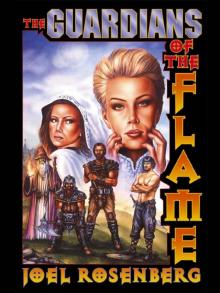 The Sword and the Chain
The Sword and the Chain Not Quite Scaramouche
Not Quite Scaramouche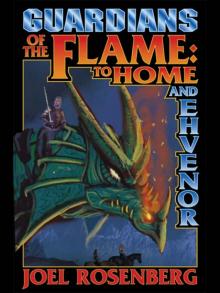 Guardians of The Flame: To Home And Ehvenor (The Guardians of the Flame #06-07)
Guardians of The Flame: To Home And Ehvenor (The Guardians of the Flame #06-07)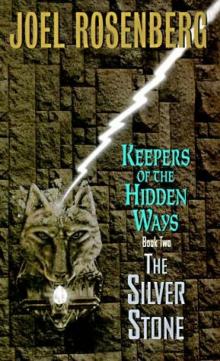 The Silver Stone
The Silver Stone Hero
Hero Not For Glory
Not For Glory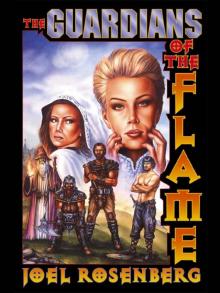 The Sleeping Dragon
The Sleeping Dragon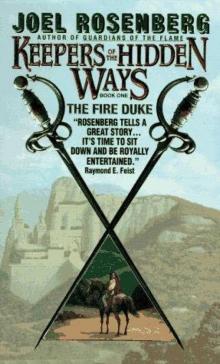 The Fire Duke
The Fire Duke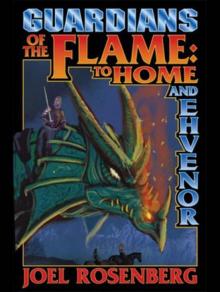 Guardians of The Flame: To Home And Ehvenor (Guardians of the Flame #06-07)
Guardians of The Flame: To Home And Ehvenor (Guardians of the Flame #06-07)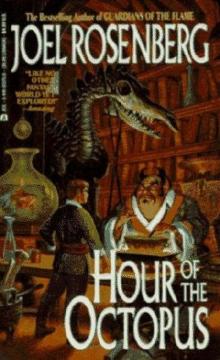 Hour of the Octopus
Hour of the Octopus Emile and the Dutchman
Emile and the Dutchman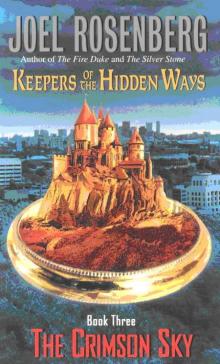 The Crimson Sky
The Crimson Sky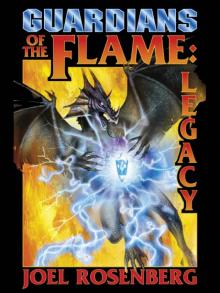 Guardians of the Flame - Legacy
Guardians of the Flame - Legacy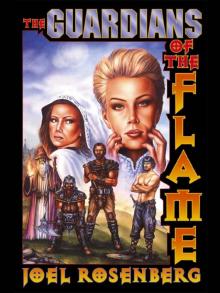 The Silver Crown
The Silver Crown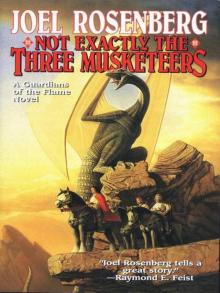 Not Exactly The Three Musketeers
Not Exactly The Three Musketeers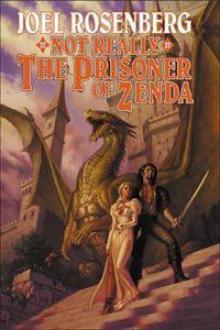 Not Really the Prisoner of Zenda
Not Really the Prisoner of Zenda